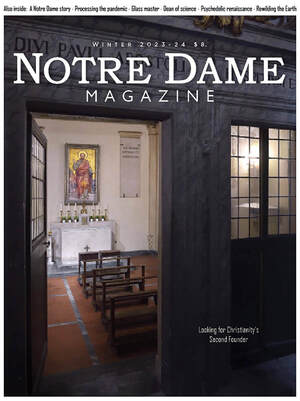
In 1977, when I was in conversations with Notre Dame’s development operation about coming here to work, I was given some materials Father Hesburgh had written as the rationale for a fundraising campaign. The document included these paragraphs:
“Two predictions are fairly obvious as one views the recent past: first, there will be enormous changes that we can no more visualize or imagine than someone 50 years ago could visualize what was about to happen and at what a staggering rate of change; and second, one might predict that this changing world will confront
humankind with enormous new moral problems of unprecedented proportion and consequences. It has always been difficult for modern humans to develop as quickly in moral stature as they do scientifically and technically.
“Granting these two future probabilities, enormous change to come and the immense moral challenges that this change will present, one might make two more predictions. Universities, the font of most human knowledge and knowledgeable people, will be at the heart of generating the people who, in turn, generate the change. And secondly, it will take a very special kind of university to direct change in such a way that humans do not destroy themselves and their world.
“All this is meant to indicate that the future, uncertain though it is, will not be all that frightening if we have some institutions that undertake the dual task of transmitting and expanding knowledge, but, at the same time, the more difficult role of educating human persons with that sense of moral responsibility and judgment required to manage change and to use knowledge for mankind’s betterment and progress, instead of for his destruction. It is this kind of institution that Notre Dame aspires to be in the years ahead.”
That sealed it. I wanted to be part of that. The call seems even more critical today than it did in the 1970s.
Around the same time, this other Hesburgh statement was being widely quoted: “Notre Dame can and must be a crossroads where all the vital intellectual currents of our time meet in dialogue, where the great issues of the Church and the world are plumbed to their depths, where every sincere inquirer is welcomed and listened to and respected by a serious consideration of what he has to say about his belief or unbelief, his certainty or uncertainty, where the differences of culture and religion and conviction can coexist with friendship, civility, hospitality, respect and even love; a place where the endless conversation is harbored and not foreclosed.”
This “endless conversation” statement has long been my guiding principle for this magazine in its effort to help the University fulfill the vision outlined above. That’s essentially what I’ve been doing here all these years, and that’s a legacy I hope persists long into the future.
Kerry Temple is editor of this magazine.